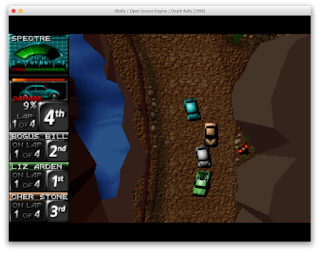While Death Rally plays well in DOSBox, and even got an official freeware Windows port, there was never a Mac version (I had to play it on my beat-up old 486) and it was never open-sourced. A few attempts have been made to decompile it but the best of these is dRally, which is 64-bit compatible and compiles out of the box (just make -j24 or as you like for your number of cores) with SDL2 on Fedora 35. The old IPX multiplayer mode isn't supported but everything else mostly works.
Once it's compiled, you'll need a copy of the game assets, of course. I have the GT Interactive retail CD; I have not tried to extract it from the Steam version, 3D Realms no longer sells it directly, and I can't find it on GoG, so let's assume you've got a disc too. For that, just copy over all the *.BPA files (make sure they remain uppercase!) and the CINEM subdirectory from the CD. Create a file called CDROM.INI that simply has one line, ./CINEM (to tell it where the movies are). Start the game in that directory (I made a directory called assets that has everything in it and just symlinked ../drally_linux for convenience).
There are two bugs I ran across, neither serious. The DOS game alternates between 640x480 and a letterboxed (in SDL) 320x200 mode; the former is used for menus and the latter for videos and actual gameplay. On my Talos II in Fedora 35 with a WX7100 there's a lot of garbage in the letterboxed area which can be improved, though not completely eliminated, with this patch. Also, at least with my GT retail copy, if you let the game sit at the menu too long it will eventually go through its brag screens and crash when it hits one that doesn't seem to be in the archive. This patch wallpapers the problem.
Otherwise, I've been gunning down other cars all afternoon, and I haven't had to fire up DOSBox to do it. Get ready to go!
